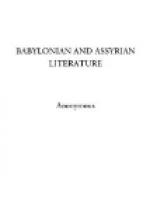The arura (great U) is valued at 88 hectares, 207 acres in the Babylonian system; a hin is almost 3 litres, or 5 pints and a quarter; 20 hins, therefore, are somewhat more than 13 gallons. The fertility of the Babylonian soil was renowned in antiquity. See Herodotus i. 193.]
[Footnote 3: A fathom, 10-1/3 feet, is the sixtieth part of a stade, 620 feet.]
[Footnote 4: This word is explained in a syllabary copied by Dr. Oppert in 1855, but which has never been published. The three signs of the ideogram ("Bit-gigunu-a”) are rendered by “kallatu” ("a bride"), and this very important statement put the translator on the track of the right interpretation.]
COLUMN II
Whosoever in the process of time, among the brothers, the sons, the family, the men and women, the servants both male and female, of the house of Kilnamandu, either a foreigner, or a guest, or whosoever he may be (or anyone else), who will destroy this field, who will venture to take away the boundary-stone, or will vindicate it: whether he consecrate this field to a god, or earn it for his superior, or claim it for himself, or change the extent, the surface, or the limits, that he reaps new harvests (crops); or who will say of the field with its measures, “There is no granter;” whether he call forth malediction and hostility on the tablets; or establish on it anyone other who change these curses, in swearing: “The head is not the head;” and in asserting: There is no evil eye;[1] whosoever will carry elsewhere those tablets; or will throw them into the water; will bury them in the earth; will hide them under stones; will burn them with fire, will alter what is written on them, will confine them into a place where they might not be seen; that man shall be cursed:
May the gods Anu, El, Hea, the Great Goddess, the great gods, inflict upon him the utmost contumely, extirpate his name, annihilate his family.
May Marduk, the great Lord of eternity without end, bind him in fetters which cannot be broken.
May Samas, the great Judge of heaven and earth, judge his unpunished misdeeds, and surprise him in flagrant deeds.
May Sin, the brilliant (Nannar), who dwells in the sacred heavens, clothe him in leprosy as in a garment, and give him up to the wild beasts that wander in the outsides of the town.
May Istar, the Queen of heaven and earth, carry him off, and deliver him for avenge to the god and the king.
May Ninip, son of the zenith, son of El the sublime, take away his lands, funds, and limits.
May Gula, the great Queen, the wife of Ninip, infilter into his bowels a poison which cannot be pushed out, and may he void blood and pus like water.
May Bin, the great Guardian of heaven and earth, the son of the warrior Anu, inundate his field.
May Serah destroy his firstborn; may he torture his flesh, and load his feet with chains.




